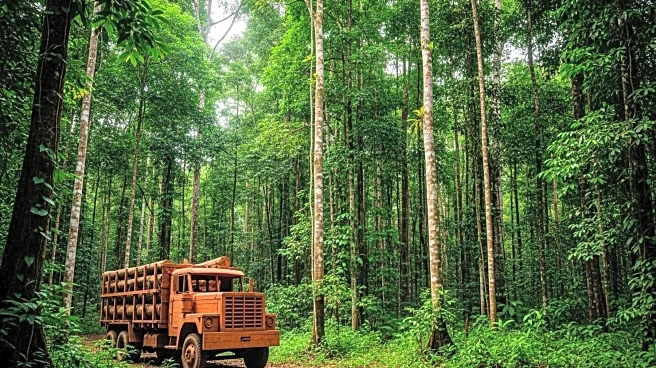What's Happening?
The Mashco Piro, one of the world's largest uncontacted tribes, is experiencing increased encounters with outsiders due to expanding logging operations in their Amazon rainforest territory. These interactions have raised alarms among activists and indigenous leaders, who warn that the tribe is in grave danger. The Mashco Piro, known for their hostility towards outsiders, have had violent encounters, including the killing of two loggers in 2024. The tribe's ancestral lands are being encroached upon by logging activities, leading to more frequent contact. Survival International, an advocacy group, has released photos showing the tribe near logging crews and cautioned that such contact could lead to violence or the spread of diseases to which the tribe has no immunity. The Forest Stewardship Council has ordered the logging company, Maderera Canales Tehuamanu, to halt operations, but there are suspicions that the order is being ignored.
Why It's Important?
The situation highlights the ongoing conflict between industrial activities and the rights of indigenous peoples. The Mashco Piro's encounters with loggers underscore the broader issue of deforestation and its impact on isolated communities. These tribes are particularly vulnerable to diseases and cultural disruption due to their lack of immunity and isolation. The logging operations not only threaten the tribe's way of life but also pose a risk to their survival. The case of the Mashco Piro is emblematic of the challenges faced by indigenous groups worldwide as they confront the encroachment of modern industry on their traditional lands. The potential for violence and disease transmission makes this a critical human rights and environmental issue.
What's Next?
The Peruvian government, through its Culture Ministry, is reviewing reports from Survival International and has established reserves and patrols to protect indigenous tribes. However, the effectiveness of these measures is in question, given the ongoing presence of logging activities. The international community and environmental organizations may increase pressure on the Peruvian government and logging companies to enforce protective measures. The situation calls for a balance between economic interests and the preservation of indigenous cultures and ecosystems. Continued advocacy and monitoring will be crucial in ensuring the safety and autonomy of the Mashco Piro and similar tribes.
Beyond the Headlines
The plight of the Mashco Piro raises ethical questions about the rights of uncontacted tribes to remain isolated and the responsibilities of governments and corporations in protecting these communities. The situation also reflects broader environmental concerns, as deforestation contributes to climate change and biodiversity loss. The case may prompt discussions on sustainable development and the need for stricter regulations on industrial activities in ecologically sensitive areas.










